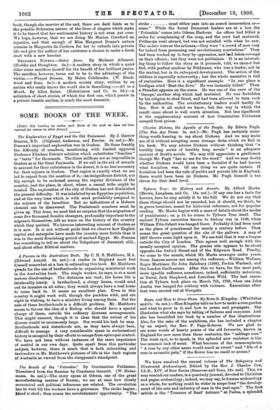The Revolt of the Potemkin.' By Constantine Feldmann. Translated from
the Russian by Constance Garnett. (W. Heine- mann. 68. net.)—The story opens at Odessa, one of the great mannfactaring centres of Russia; we see at once how closely economical and political influences are related. The revolution has to wait till the workers have a grievance. The strike begins ; blood is shed ; then comes the revolutionists' opportunity. "The strike must either pass into an armed insurrection or— cease." While the Social Democrat leaders are at a loss the Potemkin' comes into Odessa Harbour. An officer had killed a sailor for complaining of the soup, and the crew had mutinied. Feldmann went aboard, but was not satisfied with what he saw. The sailors were as the artisans,—they were "a crowd of men very far indeed from possessing real revolutionary convictions." They had been worked up to fury by oppression, and had taken revenge on their officers ; but they were not politicians. It is an interest- ing thing to follow the story as it proceeds, told, we cannot but feel, with perfect candour by Feldmann, who was a leader, not in the mutiny, but in its subequent development. The action of the soldiers is especially noteworthy ; but the whole narrative is full of curiosities. Here is a significant example. "In one place a hooligan cried • Beat the Jews.' He was instantly killed." Then a Stundist appears on the scene. He was one of the crew of the 'George,' another ship which had mutinied. He was forbidden by his religion to shed blood, and had been allowed to turn cook by the authorities. The revolutionary leaders could hardly do less. How it all ended we know ; but the way in which the result came about is well worth attention. Not less significant is the supplementary account of how Constantine Feldmann escaped from prison.














































 Previous page
Previous page